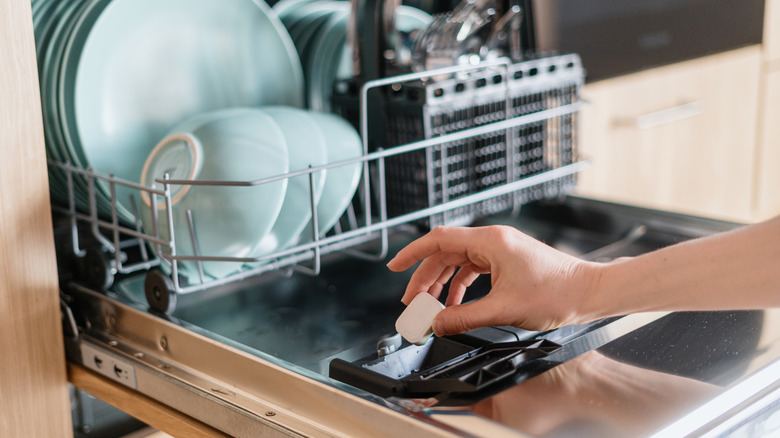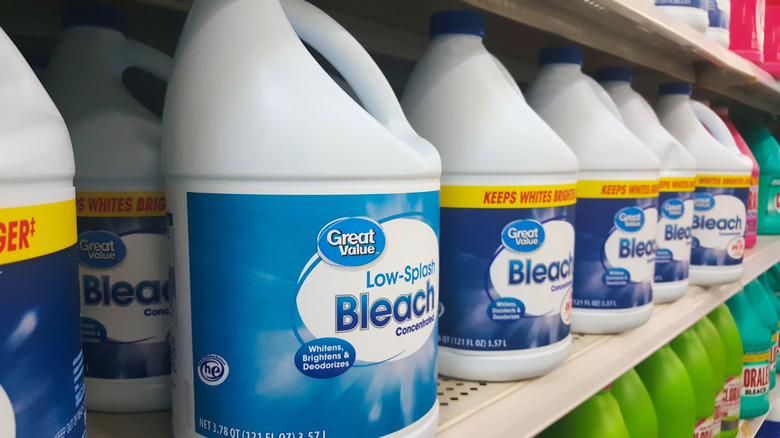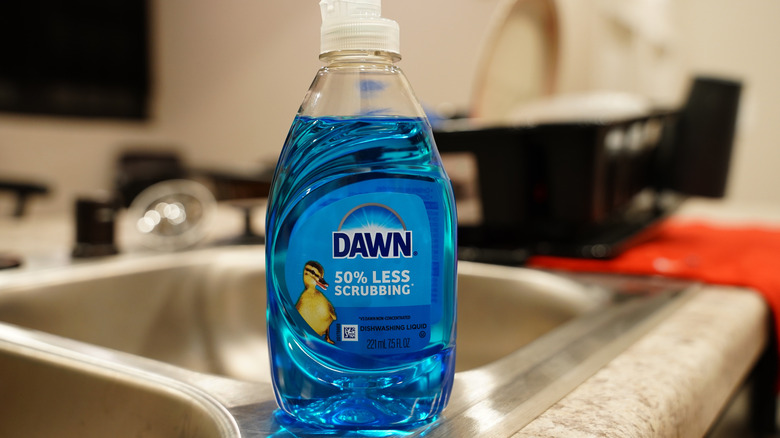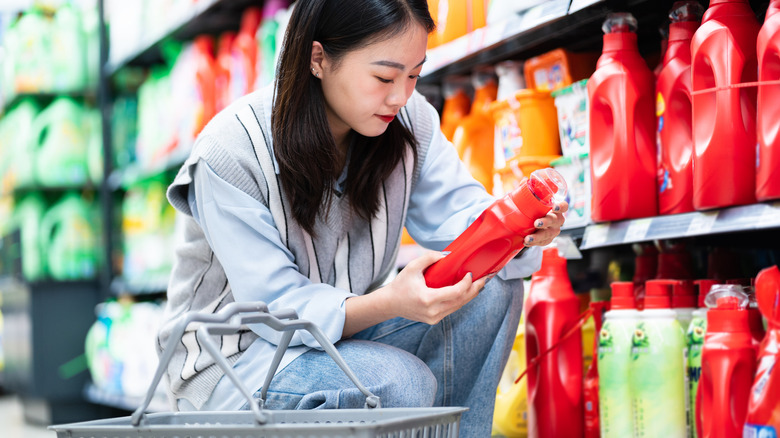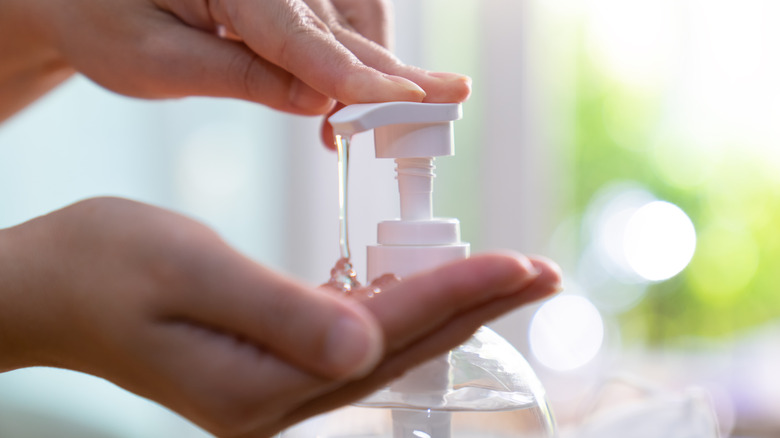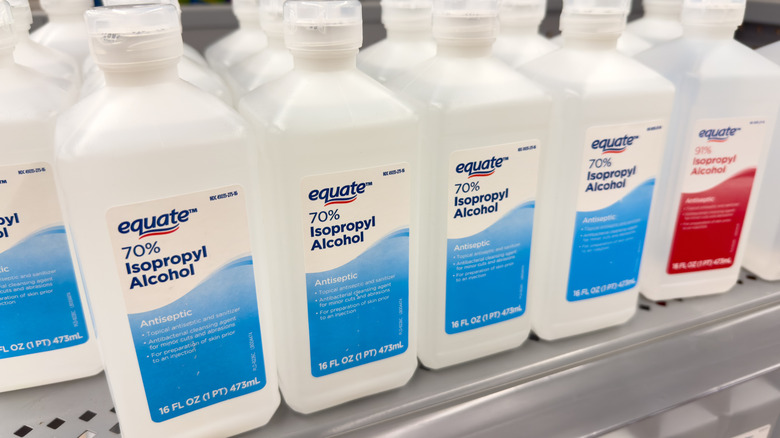5 Cleaning Agents You Should Never Add To Your Dishwasher
Ran out of dishwasher cleaning tablets? While they're specifically formulated to make washing your dishes easier, there are a few natural cleaning agents you can use in a pinch. White vinegar, a popular alternative, is safe to use and helps cut through grease and stains. Baking soda is another well-known option, as the gentle abrasive texture helps remove food particles and grease. After unloading dishes, you can also add vinegar or baking soda to your dishwasher and run a normal cycle to clean it.
That said, not all cleaning products are as effective or safe to use. There are some cleaning agents you should never add to your dishwasher, as their chemical properties can damage the stainless steel and cause your appliance to overflow. You'll also want to avoid mixing certain cleaners with dishwasher detergents. Many of them are acidic, where the reactions from mixing can form and release harmful toxins in your home that are dangerous to inhale. So, before you go reaching for your cleaning supplies, check out these five cleaning agents to avoid using in your dishwasher.
Bleach
There are plenty of mistakes everyone makes when cleaning with bleach, but the biggest is using it in situations where it could be dangerous or cause damage. While you may already be aware of more common bleach hazards, you might not know that this is one cleaning agent that you should never add to your dishwasher. Bleach can damage the stainless steel parts of the appliance. Also, household bleaches contain sodium hypochlorite. When heated, such as during a dishwasher cycle, it can release chlorine fumes in your home that can irritate your respiratory system and eyes.
You also don't want to mix bleach with your dishwasher cleaning tablets. The U.S. Centers for Disease Control and Prevention warn about this, stating that doing so may release harmful vapors to inhale. Even though bleach is commonly used for "cleaning," The CDC highlights the fact that it's not actually a cleaner; it's a disinfectant. So, while it can kill germs on your floors and counters, you're better off sticking with plain soap and water to lift food particles and fight tough grease.
Dish soap
Dish soap may sound like an easy solution and make sense to use as an alternative for dishwasher detergent. After all, it cleans the dishes, so it's safe to use for the dishwasher too, right? Not quite. Unfortunately, the appliance isn't designed for it. Unlike dishwasher detergent, which cleans with enzymes and is designed to dissolve in the water, regular dish soap utilizes suds to clean dishes. If you put dish soap in the dishwasher, it can form excessive suds during a washing cycle, with the potential to overflow from your dishwasher and flood your kitchen.
Dish soap fights tough grease and can help you clean dishes by hand, but it's not designed to handle the high-temperature and high-pressure cycles of a dishwasher. If you're tempted to squeeze a tad into your dishwasher dispenser, think about the costly damage that excessive suds can do to the appliance. A bubbly mess is easy to clean in a bathtub, but it has the potential to damage the dishwasher components, surrounding flooring, and nearby plumbing.
Laundry detergent
You may have heard about using dishwasher detergents to clean your washing machine, and vice versa. Unfortunately, this is another "hack" you should avoid trying. While washing machines and dishwashers have similarities in how they function, laundry detergent is designed for cleaning fabrics, not dishes. Similar to dish soap, laundry detergents are formulated to create a lot of suds. This can overflow from the dishwasher and cause a soapy mess. It also has the same potential to cause damage to the appliance, such as to the pump and motor of the dishwasher.
One important factor to pay attention to is the ingredient label of laundry detergent. Many traditional laundry detergents contain chemicals harmful for humans, like fragrances, brighteners, and even bleach. You've already learned the dangers of bleach when added to your dishwasher. Imagine the dangers of these chemicals not being completely rinsed off before loading your dishes and using them with your food. It's not worth the risk.
Hand soap
It might sound obvious, but it's definitely worth explaining why you shouldn't use hand soap in a dishwasher. Like dish soap, hand soap relies on creating suds to clean, but it's specifically formulated for use your skin. If tossed in a dishwasher, the suds formed from hand soap can overflow from the appliance and damage both your dishwasher and the floors.
Hand soap is meant to kill bacteria on your skin, not break down food particles and grease like dishwasher detergent. Because of this, you could end up with dishes that don't come out of the dishwasher fully clean. You also don't want the fragrances and other ingredients commonly added to hand soap to remain inside your dishwasher and get onto your dishes. Sometimes, the residue from hand soap can linger even after washing, which can "sneak" into your food and cause a gross aftertaste. Instead, reserve hand soap for your hands.
Isopropyl alcohol
Alcohol, specifically isopropyl alcohol, is popularly used for removing rust from metal items and surfaces, including that of a stainless steel dishwasher. But using it to clean your dishes or disinfect the inside of your dishwasher is a different story. First and foremost, alcohol is highly flammable. When running a dishwasher cycle, the high temperature levels within the appliance can create the perfect environment for fire ignition. Also, alcohol has the potential to damage rubber and plastic, which likely includes the components of your dishwasher interior.
While it's okay to use a mixture of alcohol and water for your dishwasher's metal exterior and as a disinfectant, it's not recommended for cleaning inside the appliance. You also don't want to mix alcohol (or anything for that matter) with your dishwashing detergent. If you don't have any detergent left, stick to hand washing with dish soap until your next grocery run. If you want to give the interior of your dishwasher a deep clean, white vinegar and baking soda are the safest alternatives.
